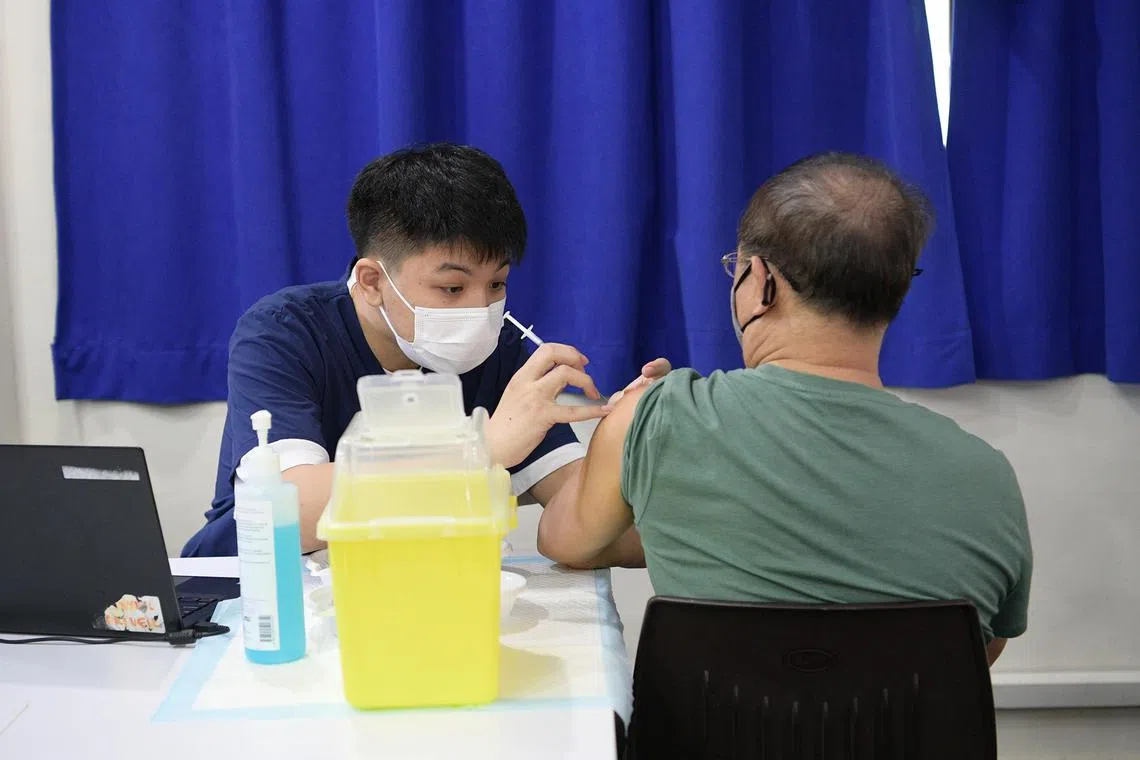askST: Can current vaccines protect against new Covid-19 variants?
Sign up now: Get ST's newsletters delivered to your inbox

The existing XBB monovalent vaccine is still effective in preventing severe disease among seniors aged 60 and above, which result in hospitalisation and death.
PHOTO: ST FILE
Follow topic:
SINGAPORE – The Sars-CoV-2 virus that causes Covid-19 is constantly mutating and evolving, allowing the virus to generate new variants and replace older variants as it circulates over time.
Due to the genetic changes in the spike proteins, a newer KP.2 variant, derived from the JN.1 Covid-19 sub-variant, which appeared in September 2023 in France, has emerged bearing both of these mutations and is currently the predominant strain in many countries.
Associate Professor Yvonne Su of the emerging infectious diseases research programme at Duke-NUS Medical School said those who were previously infected with JN.1 are likely to maintain a good-level antibody protection against the KP.2 variant.
1. Since the most updated vaccine targets XBB.1.5, a variant that is notably different from JN.1 and its descendants, can it protect us?
Dr Leong Hoe Nam, an infectious disease doctor from Rophi Clinic, said the XBB.1.5 vaccine was found to be about 50 per cent effective against JN.1. This could mean that it is less effective in preventing infections with KP.1 and KP.2.
Professor Paul Tambyah, the president of the International Society for Infectious Diseases, said that given the current widespread infections by JN.1 and previously by XBB, and with the high vaccination rates of both the Wuhan strain and bivalent vaccines in Singapore, it is quite possible there may be some benefits from the XBB monovalent vaccine.
These benefits cannot be simply picked up by laboratory investigative procedures that measure antibody levels.
2. Should Singapore residents wait for a new vaccine before getting inoculated?
Prof Tambyah said the key question is when the new JN.1 vaccines will become available.
He added that the major regulatory agencies, including the World Health Organisation and the European Medicines Agency, have suggested a strain change to a JN.1 vaccine for the 2024 to 2025 season.
If they become available, they would probably be more useful than the XBB monovalent vaccine. Then the next big question is when they will become available in Singapore.
Prof Su said the pharmaceutical companies Pfizer and Moderna have shown that they can develop vaccines rapidly, so it is anticipated that a JN.1 formulation will soon replace the current XBB for the next Covid-19 vaccine.
Dr Leong noted that doctors and the authorities firmly believe the existing XBB monovalent vaccine is still effective in preventing severe disease in seniors aged 60 and above, which could otherwise result in hospitalisation and death.
He said those who have been infected since December 2023 would have caught the JN.1 variant and this would offer significant protection against the KP.1 and KP.2.


